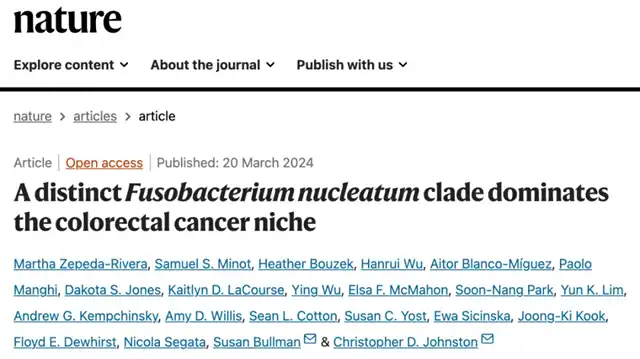This oral bacterium is actually related to 50% of colorectal cancer cases
- A Single US$2.15-Million Injection to Block 90% of Cancer Cell Formation
- WIV: Prevention of New Disease X and Investigation of the Origin of COVID-19
- Why Botulinum Toxin Reigns as One of the Deadliest Poisons?
- FDA Approves Pfizer’s One-Time Gene Therapy for Hemophilia B: $3.5 Million per Dose
- Aspirin: Study Finds Greater Benefits for These Colorectal Cancer Patients
- Cancer Can Occur Without Genetic Mutations?
This oral bacterium is actually related to 50% of colorectal cancer cases
- Red Yeast Rice Scare Grips Japan: Over 114 Hospitalized and 5 Deaths
- Long COVID Brain Fog: Blood-Brain Barrier Damage and Persistent Inflammation
- FDA has mandated a top-level black box warning for all marketed CAR-T therapies
- Can people with high blood pressure eat peanuts?
- What is the difference between dopamine and dobutamine?
- How long can the patient live after heart stent surgery?
This oral bacterium is actually related to 50% of colorectal cancer cases
Fusobacterium nucleatum (Fn) is a common oral microorganism rarely found in the lower gastrointestinal tract of healthy individuals. However, it is enriched in colorectal cancer (CRC) tissues, which has led researchers to pay attention to it as an emerging cancer-related bacterium. Compared to non-cancerous colorectal tissues, Fn is enriched in colorectal cancer (CRC) tissues.
Previous studies have shown that colorectal cancer patients with high levels of Fn have lower survival rates. Fn colonizes tumor regions with immune and epithelial cell functions that support cancer progression, persists in metastatic tumors, and microbial community modulation targeting Fn can alter the course of colorectal cancer. Furthermore, exogenous Fn infection in animal and cell models supports the carcinogenic role of this bacterium.
However, there are considerable strain-to-strain differences in the genotype and phenotype of Fn. This heterogeneity poses a challenge to reproducing its carcinogenic phenotype in animal and cell models. Additionally, some studies suggest that only specific strains of Fn may have carcinogenic potential.
On March 20, 2024, researchers from the Fred Hutchinson Cancer Center published a research paper titled “A distinct Fusobacterium nucleatum clade dominates the colorectal cancer niche” in the academic journal Nature.
The study revealed that a subtype of the common oral microorganism Fn, called Fna C2, can enter the intestines and grow within colorectal cancer tumors, making it the main driver of colorectal cancer progression and poorer prognosis in patients after treatment. This discovery may help improve the treatment and early screening methods for colorectal cancer.

Fn (Fusobacterium nucleatum) can be divided into four different subspecies (Fna, Fnn, Fnp, Fnv), with Fna being the main subspecies isolated from colorectal tumors. Fna is considered a single subspecies, but genomic analysis shows that Fna is actually composed of two different evolutionary branches (Fna C1 and Fna C2), with Fna C2 dominating the tumor microenvironment of colorectal cancer. By isolating 195 genetic differences between Fna C1 and Fna C2, the research team found that tumor-infiltrating Fna C2 acquired unique genetic characteristics that allow it to pass through the mouth, withstand stomach acid, and then grow in the lower gastrointestinal tract.
Next, the research team examined colorectal cancer tumors taken from about 200 colorectal cancer patients and measured the levels of Fn. The results showed that in about 50% of colorectal cancer cases, the abundance of a specific subtype of Fn (Fna C2) was higher in tumor tissues compared to healthy tissues.
Additionally, through metagenomic analysis, the research team further compared stool samples from over 600 colorectal cancer patients and over 600 healthy individuals. The results showed that the levels of Fna C2 in the stool samples of colorectal cancer patients were also higher.
In this latest study, the research team found that the Fn subtype Fna C2 is the main culprit behind colorectal tumor growth. This indicates that treatment and screening targeting the Fna C2 subtype in the microbial community will benefit high-risk groups with more invasive colorectal cancer. Furthermore, the research team stated that this study provides an important opportunity for the development of microbial cell therapy, which directly delivers modified bacterial strains to tumors for treatment.
This oral bacterium is actually related to 50% of colorectal cancer cases
(source:internet, reference only)
Disclaimer of medicaltrend.org
Important Note: The information provided is for informational purposes only and should not be considered as medical advice.



